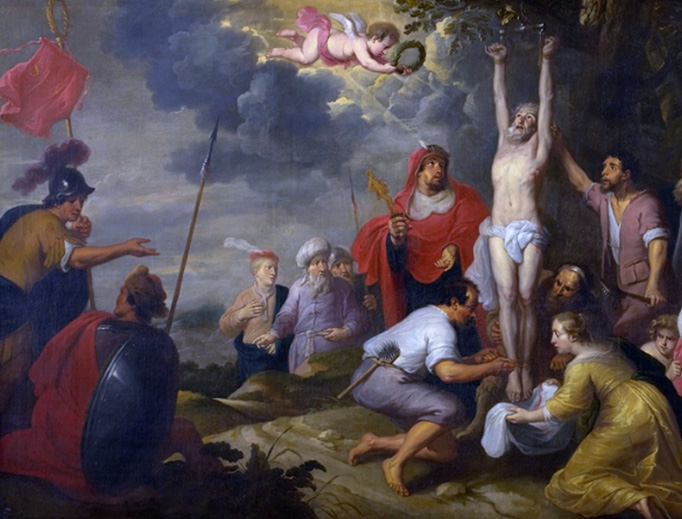St. Blaise Once Healed My Father and He Can Heal You Too
Through the intercession of Saint Blaise, bishop and martyr, may God deliver us from every disease of the throat, and from every other illness

Years ago, I visited the fascinating walled city of Dubrovnik, Croatia. It was there I learned more about St. Blaise. Although I’d had my throat blessed on his feast day, Feb. 3, a few times over the years, I had never really understood why.
The city has honored St. Blaise as its patron since the year 971, when he reportedly appeared to the residents to warn them of a coming attack. At the entrance gates to the city stands a statue to him, and the cathedral holds his relics.
Bishop Blaise was martyred in Sebastea, Armenia, in 316. According to reports of about 400 years later, Blaise was a beloved bishop who encouraged the spiritual and physical health of his people. Although the Edict of Toleration (311), granting freedom of worship in the Roman Empire, was already in place several years, persecution was still common throughout Armenia. Blaise felt a call to live in seclusion, and fled to the mountains where he lived as a hermit, making friends with wild animals. A group of hunters seeking wild animals for the amphitheater discovered Blaise’s cave, where they were astounded to find the bishop kneeling in prayer surrounded by calm and gentle wolves, lions and bears.
According to the legend, as the hunters took Blaise off to prison, a mother came along her young child, who had a fish bone lodged in his throat. When Blaise prayed over the boy, he was able to cough up the bone. Other miracles were attributed to him. Later, the governor of Cappadocia tried to persuade Blaise to sacrifice to pagan idols. Blaise refused and was beaten for it. The next time he refused, he was hung from a tree and his flesh torn with iron combs or rakes. Eventually he was beheaded.
This dramatic story popped into my head a few years ago, when my father was in the hospital with an infection that had caused a stroke. The stroke affected my dad's swallowing and he was unable to eat, swallow or talk normally. He had a feeding tube and every day a “swallowing specialist” would come and assess whether his swallowing had improved enough for him to begin taking food again. Day after day there was no improvement as my father's saliva was suctioned. The feeding tube brought on other problems, including a new infection. Of course, I was praying for my father to be healed, praying the Rosary, Divine Mercy and more with him. But with my dad's medical crisis centered around his throat, I suddenly thought of St. Blaise. Maybe it was a nudge from the bishop himself. I only know that I thought, “this is the man for the job,” and moved him to the top of my list of heavenly intercessors. I started asking for St. Blaise's help right then and there, as my father's condition was worsening, finding a prayer for his intercession online.
I told my dad about this new reason for hope and he smiled and mouthed, “great idea!” I'm sure he sent up a few prayers to the good saint too.
The next afternoon my father started speaking. In order to speak, he had to take the saliva suction tube out of his mouth, and that's when he realized he was swallowing normally again. Best of all, when the doctor came around to assess his swallowing again later that evening, she said he could start back on regular food — no more feeding tube! I looked at my healed dad and he said, “That was our friend, St. Blaise for sure!” I've never forgotten to urge others to ask St. Blaise to jump in when there's any issue related to the throat.
St. Blaise’s intercession has been invoked in the east for illnesses related to the throat since the sixth century. By the ninth century, his reputation as a healer spread throughout Europe. He became one of the most popular saints of the Middle Ages, venerated as one of the “Fourteen Holy Helpers” (which also included saints such as St. Christopher, St. Erasmus, St. Denis of Paris, St. Barbara, St. Catherine of Alexandria and St. Giles.)
Numerous churches and altars were dedicated for St. Blaise.
The custom of blessing the throats developed, with priests holding two candles — blessed the day before on Candlemas, Feb. 2 — over the head or the throat while invoking the intercession of St. Blaise against any ailment of the throat and body.
Invocation of St. Blaise
St. Blaise,
gracious benefactor of mankind
and faithful servant of God,
who for the love of our Savior
did suffer so many tortures with patience and resignation;
I invoke thy powerful intercession.
Preserve me from all evils of soul and body.
Because of thy great merits God endowed thee
with the special grace to help
those that suffer from ills of the throat;
relieve and preserve me from them,
so that I may always be able to fulfill my duties,
and with the aid of God's grace perform good works.
I invoke thy help as special physician of souls,
that I may confess my sins sincerely
in the holy sacrament of Penance
and obtain their forgiveness.
I recommend to thy merciful intercession
also those who unfortunately concealed a sin in confession.
Obtain for them the grace to accuse themselves sincerely
and contritely of the sin they concealed,
of the sacrilegious confessions
and communions they made,
and of all the sins they committed since then,
so that they may receive pardon,
the grace of God,
and the remission of the eternal punishment.
Amen.
- Keywords:
- healing
- st. blaise
- blessing of throats

















